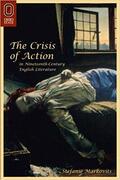
We think of the nineteenth century as an active age–the age of colonial expansion, revolutions, and railroads, of great exploration and the Great Exhibition. But in reading the works of Romantic and Victorian writers one notices a conflict, what Stefanie Markovits terms “a crisis of action.” In her book, The Crisis of Action in Nineteenth-Century English Literature, Markovits maps out this conflict by focusing on four writers: William Wordsworth, Arthur Hugh Clough, George Eliot, and Henry James. Each chapter offers a “case-study” that demonstrates how specific historical contingencies–including reaction to the French Revolution, laissez-faire economic practices, changes in religious and scientific beliefs, and shifts in women’s roles–made people in the period hypersensitive to the status of action and its literary co-relative, plot. By emphasizing the importance of inaction–both frustrated action and internalized action–Markovits shows how the Victorian psychological novel develops out of Romantic poetry. But her concerns are ethical as well as generic. Aristotelian models of development see character as the product of actions. Yet in the writings considered, perceptions of characters come not from what they do, but from what they cannot do. This shift has moral consequences: must one do the right thing, or is it enough to will it? How does literary work relate to this question? Through an historically sensitive analysis, Markovits reinvests the idea of action with its Victorian weightiness.